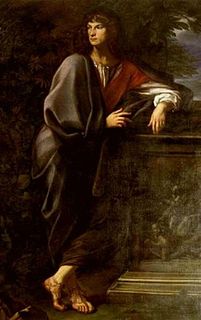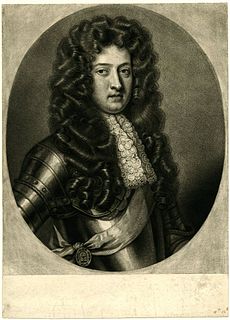Related Research Articles

Marquess of Winchester is a title in the Peerage of England that was created in 1551 for the prominent statesman William Paulet, 1st Earl of Wiltshire. It is the oldest of six surviving English marquessates; therefore its holder is considered the premier marquess of England. The current holder is Nigel Paulet, 18th Marquess of Winchester, whose son uses the courtesy title Earl of Wiltshire.

Charles Paulet, 2nd Duke of Bolton was Lord Lieutenant of Ireland, Member of Parliament for Hampshire and a supporter of William III of Orange.

Charles Paulet, 1st Duke of Bolton, was an English nobleman, the son of John Paulet, 5th Marquess of Winchester, and his first wife, Jane Savage.

Baron Hastings is a title that has been created three times. The first creation was in the Peerage of England in 1290, and is extant. The second creation was in the Peerage of England in 1299, and became extinct on the death of the first holder in c. 1314. The third creation was in the Peerage of England in 1461, and has been in abeyance since 1960.

Baron Bolton, of Bolton Castle in the County of York, is a title in the Peerage of Great Britain. It was created in 1797 for the Tory politician Thomas Orde-Powlett, who had previously served as Chief Secretary for Ireland. Born Thomas Orde, he was the husband of Jean Mary Browne-Powlett, illegitimate daughter of Charles Powlett, 5th Duke of Bolton, who had entailed the greater part of his extensive estates to her in default of male issue of his younger brother Harry Powlett, 6th Duke of Bolton.

Earl of Sunderland is a title that has been created twice in the Peerage of England. The first creation came in 1627 in favour of Emanuel Scrope, 11th Baron Scrope of Bolton. The earldom became extinct on his death in 1630 while the barony became either extinct or dormant. The second creation came in 1643 in favour of the Royalist soldier Henry Spencer, 3rd Baron Spencer of Wormleighton. The Spencer family descended from Sir John Spencer who acquired the Wormleighton estate in Warwickshire and the Althorp estate in Northamptonshire. His grandson Sir John Spencer was a Knight of the Shire for Northamptonshire. The latter's grandson Sir Robert Spencer represented Brackley in Parliament in the late 16th century. In 1603 Sir Robert was raised to the Peerage of England as Baron Spencer of Wormleighton. He was succeeded by his eldest surviving son, William, the second Baron. He had previously represented Northamptonshire in Parliament. His eldest son was the aforementioned third Baron. In July 1643 he was created Earl of Sunderland in the Peerage of England. Lord Sunderland was killed at the Battle of Newbury in September of the same year. He was succeeded by his two-year-old only son, Robert, the second Earl. He later gained great distinction as a statesman and notably served four times as Secretary of State for the Southern Department.
Earl of Sussex is a title that has been created several times in the Peerages of England, Great Britain, and the United Kingdom. The early Earls of Arundel were often also called Earls of Sussex.
Scrope is the name of an old English family of Norman origin that first came into prominence in the 14th century. The family has held the noble titles of Baron Scrope of Masham, Baron Scrope of Bolton, and for a brief time, the Earl of Wiltshire.
Lord William Howard was an English nobleman and antiquary, sometimes known as "Belted or Bauld (bold) Will".

John Egerton, 3rd Earl of Bridgewater KB PC was a British nobleman from the Egerton family.

Scroop Egerton, 1st Duke of Bridgewater, known as Viscount Brackley from 1687 to 1701 and as the 4th Earl of Bridgewater from 1701 to 1720, was a British peer, courtier and pioneering landowner.
Margaret Beauchamp was the oldest daughter of Sir John Beauchamp, de jure 3rd Baron Beauchamp of Bletsoe, and his second wife, Edith Stourton. She was the maternal grandmother of Henry VII.

Thomas Dacre, 2nd Baron Dacre of Gilsland, KG was the son of Humphrey Dacre, 1st Baron Dacre of Gilsland and Mabel Parr, great-aunt of queen consort Catherine Parr, the sixth and final wife of King Henry VIII of England. His mother was the daughter of Sir Thomas Parr of Kendal by his wife, Alice Tunstall.
Emanuel Scrope, 1st Earl of Sunderland, 11th Baron Scrope of Bolton was an English nobleman. He was Lord President of the King's Council in the North.

Thomas Scrope, 10th Baron Scrope of Bolton was the son of Henry Scrope, 9th Baron Scrope of Bolton and Margaret Howard, daughter of Henry Howard, Earl of Surrey and Frances de Vere.

Sir William Courtenay of Powderham in Devon was a prominent member of the Devonshire gentry. He was Sheriff of Devon in 1579–80 and received the rare honour of having been three times elected MP for the prestigious county seat (Devon) in 1584, 1589 and 1601.
Roger Scrope, 2nd Baron Scrope of Bolton was a member of the English peerage in the late fourteenth century.
Mary Paulet, Marchioness of Winchester was the second wife of Charles Paulet, 6th Marquess of Winchester. She was an illegitimate daughter of Emanuel Scrope, 1st Earl of Sunderland, by his mistress Martha Jeanes, or Janes, or Jones, alias San(d)ford. Although sometimes described as "Duchess of Bolton", she died before her husband was created a duke. Her son Charles succeeded his father as Duke of Bolton.

William Eure, 2nd Baron Eure was a Tudor-era English nobleman, soldier, and official in the Scottish Marches.
Philadelphia Scrope was an English aristocrat and courtier.
References
- Rayment, Leigh. "Baron Scrope of Bolton". Australia. Archived from the original on 8 June 2008. Retrieved 1 April 2018.
{{cite web}}: CS1 maint: unfit URL (link) - Mosley, Charles, ed. (2003). Burke's Peerage, Baronetage and Knightage (107th ed.). London: Cassells.